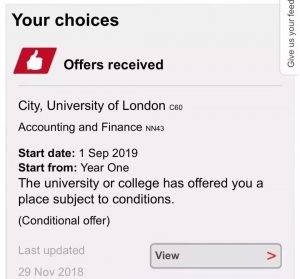Your experience as an offer holder can feel really daunting. However, it doesn’t have to be! The first thing to remember, is not to feel rushed. If you receive your last offer on or before 19 May 2022, your reply date is 9 June 2022. If you applied later or through ‘Extra’ and your last offer was on or before 14 July 2022, your reply date is 21 July 2022. I found when I applied, I had all my 5 offers in before April, therefore it gave me several months to make decisions. When deciding, you get two choices, ‘firm’, and ‘insurance’. It’s sensible to make your ‘insurance’ option, an offer that is lower entry requirements than your ‘firm’ choice, therefore if you do not meet the entry requirements for your firm choice (e.g., 120 UCAS points), then if you make the entry requirements for your ‘insurance’ choice (e.g., 98 UCAS points) then you automatically get accepted at that choice. However, you can insurance an offer that is higher UCAS points needed than your firm choice or not bother with an insurance choice at all.
2022. If you applied later or through ‘Extra’ and your last offer was on or before 14 July 2022, your reply date is 21 July 2022. I found when I applied, I had all my 5 offers in before April, therefore it gave me several months to make decisions. When deciding, you get two choices, ‘firm’, and ‘insurance’. It’s sensible to make your ‘insurance’ option, an offer that is lower entry requirements than your ‘firm’ choice, therefore if you do not meet the entry requirements for your firm choice (e.g., 120 UCAS points), then if you make the entry requirements for your ‘insurance’ choice (e.g., 98 UCAS points) then you automatically get accepted at that choice. However, you can insurance an offer that is higher UCAS points needed than your firm choice or not bother with an insurance choice at all.
When I applied for Bournemouth University to study Soci al Work, I was around 8 UCAS points short of what the entry requirements were for the course, however I still applied and demonstrated through my personal statement my experience working for the NHS, which carried me through to the interview stage. At interview stage, you’re judged based on your performance that day, therefore my UCAS points became mostly irrelevant from here onwards. Don’t be put off applying or ‘firming’ choices that may be asking for above what you are currently achieving, some universities will still accept you depending on demand, your own application, or you may surprise yourself and achieve higher grades than you first thought. UCAS Points are only one part of what makes an application.
al Work, I was around 8 UCAS points short of what the entry requirements were for the course, however I still applied and demonstrated through my personal statement my experience working for the NHS, which carried me through to the interview stage. At interview stage, you’re judged based on your performance that day, therefore my UCAS points became mostly irrelevant from here onwards. Don’t be put off applying or ‘firming’ choices that may be asking for above what you are currently achieving, some universities will still accept you depending on demand, your own application, or you may surprise yourself and achieve higher grades than you first thought. UCAS Points are only one part of what makes an application.
I personally found making the use of Applicant Experience Days and Open Days a huge help when deciding upon universities. Open Days incorporate talks and stalls on all areas, such as finan ce, applications, societies, the campus, and accommodation. You can speak to current students, meet your potential peers, meet lecturers, and experience campus and accommodation tours first-hand. You can sit in on subject talks to learn more about how the course is taught, assessed and what it entails. You may receive an email to attend an ‘Applicant Experience Day’. These are held by certain universities for certain courses and involve a taster day at the university, joining in with activities, lectures, and meeting the teams, so you get a feel for the university and what a day studying that subject may look like. These are invite-only, for those who are offer holders, so you’re among those who demonstrate the potential to study this course at this university. They’re more relaxed than an interview as you’re not up against a panel of the team, you’re merely there to help your decision choice.
ce, applications, societies, the campus, and accommodation. You can speak to current students, meet your potential peers, meet lecturers, and experience campus and accommodation tours first-hand. You can sit in on subject talks to learn more about how the course is taught, assessed and what it entails. You may receive an email to attend an ‘Applicant Experience Day’. These are held by certain universities for certain courses and involve a taster day at the university, joining in with activities, lectures, and meeting the teams, so you get a feel for the university and what a day studying that subject may look like. These are invite-only, for those who are offer holders, so you’re among those who demonstrate the potential to study this course at this university. They’re more relaxed than an interview as you’re not up against a panel of the team, you’re merely there to help your decision choice.
Whilst waiting for my interview at Bournemouth University, I contacted the academic team and asked for advice, tips on the interview, I also as ked for more information on the course that I may not have found out at an Open Day. They were more than happy to also put me in touch with current students there studying the course, to give me feedback. Unibuddy also offers an online chat system for you to talk to current students and find out more about the course. I found this area very helpful for after Open Days when I’d think of a question, I’d forgotten to ask on the day.
ked for more information on the course that I may not have found out at an Open Day. They were more than happy to also put me in touch with current students there studying the course, to give me feedback. Unibuddy also offers an online chat system for you to talk to current students and find out more about the course. I found this area very helpful for after Open Days when I’d think of a question, I’d forgotten to ask on the day.
Remember, you’re in control when choosing which universities to firm and insurance, and that you essentially have plenty of time to make your choice, so don’t feel rushed. Make the most of visits to the university, virtually and physically, chatting to current students and getting a feel of the course, the university and if it’s right for you.

 Why I chose Bournemouth University (how to pick your uni)
Why I chose Bournemouth University (how to pick your uni) Offers and When You Need to Decide
Offers and When You Need to Decide UCAS FAQs: Your questions answered!
UCAS FAQs: Your questions answered!








